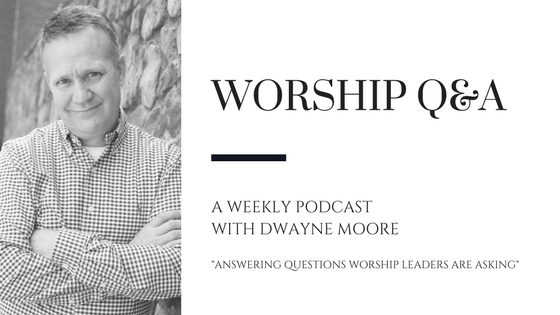What Do I Do During My Quiet Time? (Podcast)
Hello everyone and welcome to the worship Q and A podcast. I’m Dwayne Moore. Each week we try to answer questions that worship leaders are asking. Recently I was speaking at the California Baptist University in Riverside, California, and it was an incredible experience just being with the students there and being a part of what God is doing in California among worship leaders and churches. Getting to know some of the students and hearing their hearts was so encouraging for me. During a Q and A section … I should say portion of my time there one of the students asked this question that I’m going to now pass on to you. The student asked, “Dwayne what do you during your quiet times? How do you keep yourself fresh spiritually?”
Great question. Well first of all, let me say that I am not the expert on this. I am still struggling like the rest of us just to be faithful and consistent with it, but I do try every morning to invest time with God. About two to three times a week I try to actually journal what I believe God is showing me and teaching me. I want to share with you one of the most powerful ways over the years that I have learned or that I have discovered, rather, to connect with God on a personal basis, a personal intimate level. Before we jump into that and I give you a description of what I do that’s helped me so much over the years, let me do a shameless plug for a couple of things we have coming up.
First, you need to know about coaching program. Maybe you’ve already heard about it, maybe you’ve already participated in it, but I am so excited about the many people we’ve got signing up for this coaching program and all that we are learning and discovering together. We begin our next phase of our coaching program in May. This is the Impact Phase where we teach you how and help you to grow your group spiritually, numerically, musically. We’ll touch on all those things. Go to our website at nextlevelworship.com, click on the training tab and then click on the coaching image and you will see how to sign up for this powerful phase, this 10 week phase of coaching. We will meet each week online and we’ll go through some incredible and powerful and effective principles that will help you to grow your group. Not only that, we will give you an encourager that will come along beside you and encourage you as you walk this journey of trying to grow your group.
Also, sign up for our ReIMAGINE Worship Intensive. Apply for it, and you’ll have to be selected. There’s a process, not everyone that signs up gets to come because we keep it as a small select group but it’s not about the size of your church, it’s really about the size of your heart and whether God has called you to do this and put it on your heart to apply. Consider going to our website nextlevelworship.com, click again on the training tab and look for the worship leader intensive, it’s a week-long retreat in October in Louisville. Don’t miss these incredible opportunities for you to grow. As you’re praying this week, please pray for us because we continue with our five country training tour in Africa. We are training hundreds of pastors and worship leaders and worship teams, so please pray for us and our team as we do this and as we share the Gospel wherever we go.
What I want to answer for you in the same way I answered for that young man that asked me at California Baptist University, Dwayne what do you do to keep your quiet times fresh, to keep your spiritual life fresh? Well I discovered in college that one of the most powerful things I could ever do to help connect on a personal level is to go through a very simple outline in my quiet time. Now I love using devotional books, I read other people’s devotionals, I enjoy that. Sometimes I’ll just read from the Bible but when I really want to dig in and get the most out of my quiet time, here’s what I’ll do. I’ll take a piece of paper or I’ll type it out on my laptop, just be sure to turn off your notifications from Facebook and don’t be distracted by social media. You got to focus on this passage before you. Come into your quiet time already knowing what you’re going to study. I go through books of the Bible. Right now I’m going through Hebrews, I’m in chapter nine actually. I meditate on that, sometimes more than one day and I’ll just take a portion at a time, maybe just a paragraph. I’ll focus on that and I’ll write about it.
Write out the text first. Write the word text, colon and then write out whatever you’re writing about, whatever you’re focusing on, whatever you’re studying that day. It may just be a couple verses, it may be a half of a chapter. Don’t do too much but do write down whatever it is you’re focusing on. The second thing to write down is the theme. Make it a sentence. Try to write a sentence that you believe sums up what that passage, that chapter, that paragraph or whatever is about. Try to focus on that to sum up what you believe it’s about. Now listen, if you’re like me and you do it early in the morning you may be sleepy when you approach your quiet time but you’ll begin to wake up. You’ll have no choice but to wake up a little bit as you begin to have to conceptualize and sum up what that passage is talking about. Just the very fact you’re putting it into a sentence, a theme, then that’s going to cause you to have be alert.
The third thing you write down is not only the text, not only the theme but you got to justify what you just said. You said you think the theme is, whatever. Okay now you got to back that up with proof. The third thing is write this down, key verses, colon. What are the key verses? Maybe just the key passages, maybe just the key phrases that sum up or rather support what it is you believe the theme is. For example, if you’re reading Psalm 23 and you say, I believe the theme is the Lord is my shepherd then you got to find every reference and write it down, those references as key verses. You don’t write down every verse, but you do write down those key references that support the idea that you claim that it’s about the Lord is my shepherd. If that’s what you believe you got to support that.
The fourth thing you do, and don’t rush through this but by now you’re probably a good 10, 15 minutes in because you’re going to have read over that passage over and over and meditate on it to really get the theme of it. Then you’re going to have to support it with scriptures in that passage. You’re probably 10 to 15 minutes into your quiet time at this point. Now, ask yourself this question, write this down, what I believe God said to me. It’s not a definite thing, it’s not an infallible statement you’re about to make. You could be wrong and you’re not trying to go out there and teach everybody exactly what you believe God said to you. This is very personal, very intimate. You’re listening for the voice of God and what you believe He’s saying through His written Word. You don’t make up stuff, but within the context of that written word what do you sense God may be saying to you if you believe that this passage you’re reading is about the Lord is my Shepherd then how does that apply to you personally? What could He be saying to you very personally at that moment and it could be something you’ve never really noticed or seen before. Again, within the context of that passage. You’re not trying to make up stuff. You’re trying to see what God is saying within that passage. Write it as though … Here’s what I do at least. I write as though God is speaking to me. I write it like this, “Dwayne, so glad you could join me today for this quiet time. I’ve been missing you.” It could be something that way. I just get real honest with what I believe God may be saying to me. This develops over time and you may feel awkward writing what you think God is saying to you and that’s fine, I respect that. The point is, God is an intimate personal God and He wants to speak to you through His Word so you need to take time to write down what you believe God is saying to you through that passage. That maybe one or two sentences, it may be a whole paragraph, it maybe two or three paragraphs but take the time to write what you sense God is saying. Don’t ever stop, don’t quit your quiet time. You’re not finished yet. You’ve got to do the fifth one.
The fifth step. Not only do you write down the text, not only do you write down the theme and the key verses, what you believe God said to you, but now you’ve got to do one more thing. God won’t speak to us without a response. He always expects and there should always be a response. Here’s the fifth one, what I believe I am saying to God. It’s not only what God is saying to me but it’s what am I saying back to God. That’s the fifth one. That’s the response. Respond now to what you believe God has said to you in that passage. Be honest.
Often I’ll start with just a statement of praise. “Father, thank You so much for meeting with me today. Thank You for being awesome. Thank You for reminding me You are my Shepherd.” Whatever He’s reminded you of, thank Him for it, praise Him for it and then you need to be honest. Say Lord, “I’m sorry that I came into this quiet time not expecting anything.” Maybe that was your case that day then be honest, write it down. “Lord, thank You for forgiving me and cleansing me of known sin. Thank You for doing that Lord, thank You. Now Lord, help me today to trust You as my Shepherd. Help me to follow You in listening.” I’m just going along that line if you were doing Psalm 23. Whatever your passage is, you can always bring a response back. An honest, open, intimate response to your Father, your Heavenly Father, your Shepherd, your God, your Friend.
Oh can you tell I get excited about this stuff? I do. I love it. You can go on to my website, it’s a journaling website and you can read what I write and you see what the way that I do it. My website is quiettimejournal.praisemorepowerful.com. You can see years of journaling that I’ve done in there. There’s journaling from many different books of the Bible. There’s a whole lot of stuff in there, but don’t go by my devotional. This is about you. You get alone with your God and you get into His Word and you listen to what He wants to say to you. Powerful, powerful stuff. I hope this has helped you, I hope this encouraged you. I don’t want to make this legalistic. If you don’t do it like this it doesn’t mean God can’t speak. This is just a powerful way to become a student. A powerful way to become a student of God’s Word. Approach it as a student and God will teach you through His Word.
Thanks so much for joining us today for this podcast. Continue to pray for our Africa trip and we will see you back next week. Thanks.
Podcast: Play in new window | Download | Embed







Leave a Reply
You must be logged in to post a comment.